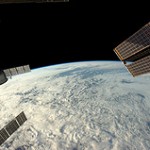Most of the astronauts and cosmonauts aboard the International Space Station (ISS) have an amateur radio license. They use the station’s ham radio to contact amateur radio stations on ground mostly in their free time, and the radio is used to contact pre-selected schools. During the ten minutes that the ISS is typically above horizon and radio contact is possible, astronauts answer the questions prepared by the students.
If a school does not have their own radio station, volunteering amateur satellite operators set up a ground station for their use. If needed, other dedicated volunteering amateur radio stations can ‘telebridge’ the radio contact with the ISS by relaying the contact to the school by telephone.
This cooperation is part of the Amateur Radio in the International Space Station project (ARISS), an international working group, consisting of delegations from nine countries including several countries in Europe as well as Japan, Russia, Canada, and the USA. The organisation is run by volunteers from the national amateur radio organisations and the international AMSAT (Radio Amateur Satellite Corporation) organisations from each country. The volunteers work closely with the national space agencies, including ESA.
The call is due to start at 10:48 CET (09:48 UT). The contact will be in Dutch and can be followed live at: https://www.justin.tv/on0snw
Students will ask as many of the following questions as time allows:
1. Op welke manier slaap je in de ruimte?
2. Wat zijn de eisen om astronaut te worden?
3. Hoe is het om de aarde van boven te zien?
4. Is er internet in het ISS?
5. Hoelang duurt het om van de aarde naar het ISS te vliegen?
6. Wat doen jullie tijdens jullie vrije tijd in de ruimte?
7. Wat gebeurt er met het menselijk lichaam, zonder enige persoonlijke bescherming of cabine, tijdens zijn verblijf in de vrije ruimte?
8. Hoe wordt het ISS van zuurstof voorzien?
9. Welke dagelijkse vaste taken moet een astronaut zeker uitvoeren?
10. Wat gebeurt er met een astronaut als hij ernstig ziek wordt in het ISS?
11. Stel dat door een onbekende reden de communicatie-verbinding met de aarde voor lange tijd uitvalt, hoe vangt men dit probleem op?
12. Kan je, in geval van nood, opereren in het ISS?
13. Hoe bepaalt men het zwaarte-massapunt van het ISS?
14. Hoe haalt een raket het ISS in?
15. Hoe worden jullie gewogen in het ISS?
16. Heb je een gevoel van snelheid in het ISS?
17. Wat gebeurt er met verpakkingsafval in het ISS?
18. Is de lancering pijnlijk voor het menselijk lichaam?
19. Hoe koud is het in de ruimte?
20. Kan je onweer op aarde zien vanuit het ISS?
English translation:
1. In what way do you sleep in space?
2. What are the requirements to become an astronaut?
3. How is it to see earth from above?
4. Is there internet in the ISS?
5. How long does it take to fly from earth to the ISS?
6. What do you do in space in your free time?
7. What happens to the human body staying in the free space without any personal protection or cabin?
8. How is the ISS provided with oxygen?
9. Which daily tasks has an astronaut to perform?
10. What happens when an astronaut gets seriously ill in the ISS?
11. Imagine that the communication link with earth collapses for a longer period, how would this problem be solved?
12. Is it possible, in case of emergency, to operate on an astronaut in the ISS?
13. How is the weight core of the ISS determined?
14. How does a rocket catch up with the ISS?
15. How is your weight measured in the ISS?
16. Have you got a feeling of speed inside the ISS?
17. What happens with the packaging garbage in the ISS?
18. Does the launching of the rocket cause a sensation of pain?
19. How cold is it in space?


Discussion: no comments